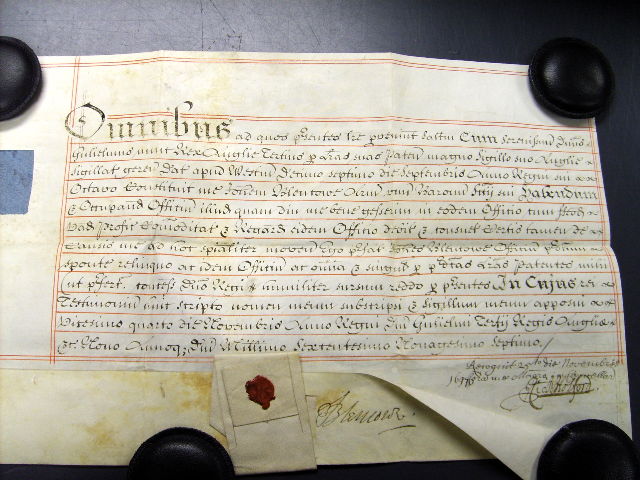A Recently Discovered Sir John Blencowe Document

Reproduced with the permission of the Society of Genealogists, 14 Charterhouse Buildings, Goswell Rd., London EC1M 7BA where it can be found in the document collection boxes which number 2000+ and are organized by surname.
John Blencowe : Letters Patent relinquishing post of Baron of the Exchequer dated 24 November 1697
(Original at Society of Genealogists) (draft translation)
To all to whom these present letters may come, Greeting. Whereas his most serene Lord William the Third, the now king of England by his Letters Patent sealed with his great Seal of England bearing the date at Westminster 17th day of September in the eighth year of his reign appointed me John Blencowe esquire as one Baron of his Exchequer. To have and to hold that office for as long as I should behave myself well in the same office with fees, wages, profits, commodities and rewards in regard to the same office due and accustomed. However, for certain causes specifically moving me in this matter, I the aforesaid John Blencowe willingly forsake the aforesaid office and the same office and all and singular by the aforesaid Letters Patent (as afore mentioned) granted by the Lord King I humbly surrender by these presents. In witness whereof, to this script I have subscribed my name and appended my seal on the twenty fourth day of November in the ninth year of the reign of Lord William the Third King of England and in the one thousandth six hundred and ninety seventh year of (our) Lord.
Blencowe
Acknowledged 25th day of November
1697 in the presence of me, Master in Chancery -
Richard Holford
Sir John Blencowe Knight : A Newly Discovered Document
This document, found, amongst the archives of the Society of Genealogists at Kew, has recently come to light thanksí to the investigation of Marilyn Astle of Alberta, Canada. The translation from the original Latin was done by Mike Walton of Fife, U K. Our thanks go to both of them.
To understand the background of this document, it is necessary to look briefly at the life of its author. Here is an abbreviated account of that life taken from The Blencowe Families book.
"Arguably, the most distinguished and influential member of the family. is John Blencowe, Knight the eldest son of Thomas Blencowe of Marston (1602-1674) and Mary Savage. He was born on the 30 November 1642, a month after the first great battle of the Civil War, fought at Edgehill. He married Anne, daughter of Dr John Wallis, a distinguished mathematician and Oxford Professor who was one of the founders of the Royal Society, the foremost Scientific Society of the age. Lady Anne Blencowe, as she became, was famous in her own right as the author of one of the first recipe books.
In 1661, Sir John entered Oriel College, Oxford, matriculating on the 24 May 1661, aged 18. He was entered as a student at the Inner Temple in 1663 and called to the Bar in 1670. In part, John's marriage assisted him in his advancement for when the Deanery of Hereford was offered to his father-in-law, Dr Wallis declined it but said, "I have a son-in-law, Mr Sergeant Blencowe, of the Inner Temple, a Member of Parliament, an able Lawyer, and not inferior to many on the Bench, of a good life and great integrity, cordial to the Government and serviceable to it".
With this recommendation John Blencowe was raised to the Bench as a Judge of Common Pleas on the 17th September 1697.and knighted on 12th December 1697.
He was made a Sergeant of Law in 1689, a Baron of the Exchequer in 1696 and a Judge of the Court of Common Pleas a year later, handing out justice through most of Queen Anne's reign. He served as M.P. for Brackley from 1690 to 1695 and was knighted in 1697.
He continued working as a Judge until he was eighty; he retired on pension on 22 June 1722, dying four years later at the age of eighty-four."
At this time the ascending order of seniority in the Royal Courts of Law, appears to be: The Court of the Exchequer, the Court of Common Pleas and finally the Kingís Bench. Sir John was made a sergeant of Law in 1689, and was offered the position of a Baron of the Court of the Exchequer in 1696. In the following year he was promoted to a judge in the Court of Common Pleas.
This document, dated 25th November 1697, appears to be a formal relinquishing of the post of Baron of the Exchequer and presumably was written when he was formally promoted to being a Judge of the Court of Common Pleas, this being a more senior post. Three weeks later on December 12th 1697, he was awarded a knighthood by William III.
Sir John is my 7XG grandfather, and when I look at his portrait, by John Closterman, which hangs in our house, he seems to have a twinkle in his eye in spite of carrying the demeanour of a distinguished judge. For those who would like to know more about Sir John, may I refer you to pages 38 to 41 of our Blencowe History.
Peter Blencowe, Walderton, UK